At the 2021 National People’s Congress and the Chinese People’s Political Consultative Conference, we are ready to go at the starting point of the new era and on the new journey.
Culture is the soul of a country and a nation. In October 2018 and October 2020, during General Secretary Xi Jinping’s two inspection tours in Guangdong, he paid great attention to historical and cultural heritage and cultural heritage protection in Guangzhou, Chaozhou, Shantou and other places, and left earnest instructions.
On the eve of this year’s National People’s Congress and the Chinese People’s Political Consultative Conference, we conducted a follow-up visit along the “cultural” footprints of the General Secretary’s inspection of Guangdong, feeling the power of dreams released by those who have been committed to the inheritance and protection of Lingnan culture, and listening to the most sincere voices from the land of Guangdong.
 Yangcheng Evening News reported on March 3, 2021 A6-A7 edition
Yangcheng Evening News reported on March 3, 2021 A6-A7 edition
Guangzhou Cantonese Opera Art Museum
【Inspection Footprints】
On the afternoon of October 24, 2018, Xi Jinping visited the Cantonese Opera Art MuseumBabaylan 1990 clothes draw and had cordial conversations with Cantonese Opera friends, hoping that they would inherit Cantonese Opera well.
【Echo of the South Guangdong]
National People’s Congress Representative, Guangdong Cantonese OperaCinema 1950 witch cloth drawParty Committee Secretary and President Zeng Xiaomin: It is our responsibility to inherit and carry forward Cantonese opera well
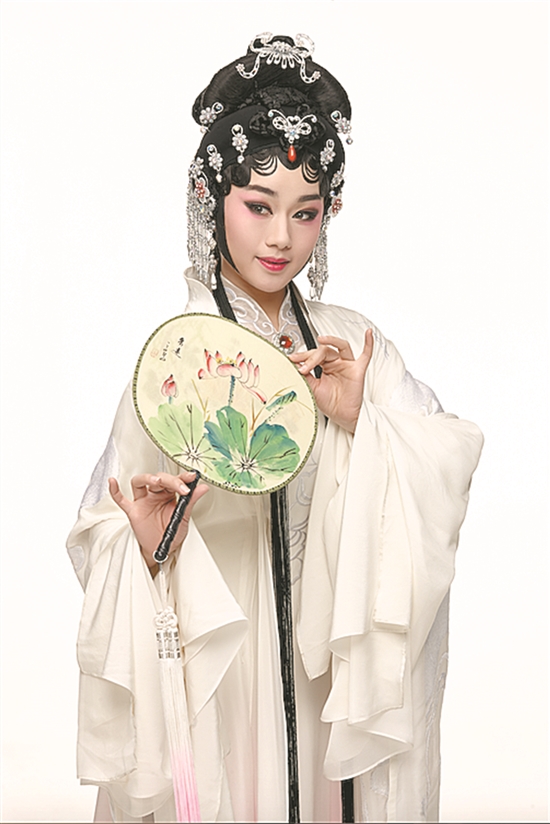 Zeng Xiaomin
Zeng Xiaomin
Cantonese opera is a world intangible cultural heritage, a representative of Lingnan culture, and our common memory, local accent and homesickness. As a Cantonese opera worker, whenever I think of the General Secretary’s concern for Cantonese opera art, I feel happy and feel more responsible. Over the years, I have been working hard to do my best to do a better job of inheriting and carrying forward the Cantonese opera.
In recent years, Guangdong Cantonese Opera Theater has done a lot of work in the inheritance and protection of Cantonese Opera. We have built a platform for young artists, and adopted the methods of Babaylan 1990 cloth draw old people bring new things, famous teachers accept apprentices, and held special sessions of “famous artists” and “professional performances” to allow young actors to learn the skills of their seniors; established “famous artists to work hard” and “famous artists to work hard” and other special sessions;Studios, allowing the older generation of Cantonese opera artists to use their remaining energy to impart their superb skills to young people; shooting the documentary “Past of Cantonese Opera” and making the older generation of Cantonese opera stories into TV films in oral form, leaving behind valuable historical information. Recording the “Cantonese Opera Ancient and Major” textbooks to rescue the ancient Cantonese opera singing styles that are on the verge of losing.
In addition, we have “digitized” the large amount of precious Cantonese opera scripts, audio-visual and picture materials accumulated by the theater over the past decades, so that these precious artistic wealth can be better preserved and passed on.
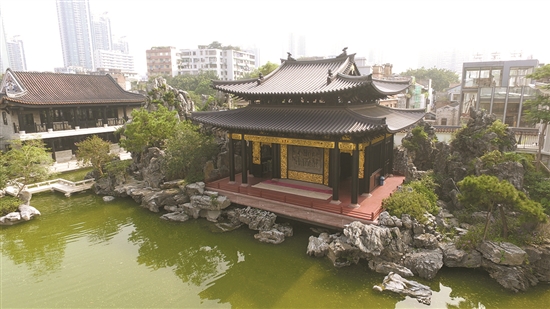 Data photo: The Cantonese Opera Art Museum has the characteristics of Lingnan gardens. In recent years, we have organized the “Cantonese Opera Entering Campus” activity and formed a Cantonese Opera Art Lecturer Group, holding more than 200 Cantonese Opera speeches every year, and spared no effort to promote excellent traditional opera culture into campuses, so that the seeds of traditional art such as Cantonese opera “take roots and sprout” in children’s hearts. Today, Xinghai Conservatory of Music, Jinan University Chinese Academy of Chinese Language, etc. have carried out compulsory and elective courses for Cantonese opera.
Data photo: The Cantonese Opera Art Museum has the characteristics of Lingnan gardens. In recent years, we have organized the “Cantonese Opera Entering Campus” activity and formed a Cantonese Opera Art Lecturer Group, holding more than 200 Cantonese Opera speeches every year, and spared no effort to promote excellent traditional opera culture into campuses, so that the seeds of traditional art such as Cantonese opera “take roots and sprout” in children’s hearts. Today, Xinghai Conservatory of Music, Jinan University Chinese Academy of Chinese Language, etc. have carried out compulsory and elective courses for Cantonese opera.
In addition, we have also created the Cantonese Opera Cultural Experience Hall, the “Guangdong Gathering” intangible cultural heritage exchange space, etc., and through the combination of various forms online and offline, we have opened up a larger space for the inheritance and promotion of Cantonese opera. For example, during the epidemic in 2020, we launched the “Online Spring Class” “Cantonese Opera Online Mini Game”, “Cantonese Opera Classic Online”, “Cantonese Opera ONLINE”, etc., have attracted nearly 10 million people to watch online.
Cantonese Opera is a vital art, and it must be better inherited and innovated to keep it alive. First of all, strict control of the content of the work, starting from creating high-quality scripts. Whether it is ancient costume dramas or modern dramas, they should be closely linked to the theme of the times and closely related to people’s lives, so as to resonate with the audience, otherwise the works will have no vitality.
Second, innovate in form, Cantonese opera is an art with a sense of the times. On the basis of adhering to the core of opera performance, we can try to add some formal innovations to elements such as stage lighting, sets, music, etc. to make the ancient Cinema 1950 witch cloth drawArt stimulates new vitality.
In addition, we should also better grasp the performance rhythm, not only the length of the play, but also the rhythm of the emotional points of the characters in the development of the plot. We should study and grasp it well to better touch the hearts of the audience.
As a Cantonese opera worker, it is my duty to inherit Cantonese opera well and carry forward it. Next,We will strive to create more excellent literary and artistic works that closely follow the contemporary themes and attract more young people to appreciate, so that the world can feel the unique charm of Chinese traditional culture.
As a National People’s Congress representative, I have been paying attention to the inheritance and innovation of excellent traditional culture over the years. At this year’s National People’s Congress, I will continue to make suggestions on this topic to promote the better inheritance and development of excellent traditional culture. (Compiled/Reporter Feng Xixi)
Guangzhou Jinan University
【Inspection Footprints】
On the afternoon of October 24, 2018, at Jinan University, Xi Jinping visited the school history exhibition and the display of school achievements, inspected the library’s documents and physical objects in the library’s overseas Chinese literature, and exchanged views with some compatriots from Hong Kong, Macao and Taiwan and overseas Chinese students, encouraging them to study hard and make contributions to society in the future.
Xi Jinping pointed out that my country has more than 50 million overseas Chinese, which is a unique advantage of my country’s development. Reform and opening up have been a contribution from overseas Chinese. He hopes that Jinan University will conscientiously implement the spirit of the National Education Conference, adhere to its own school characteristics, run the school better, and create better conditions for overseas Chinese to return to their motherland to study and inherit Chinese culture.
[Personal Eyewitness says]
Qu Xiangli, Executive Deputy Secretary of the Party Working Committee of the Panyu Campus of Jinan University and Dean of Sihai Academy: More and more Chinese students have become messengers of Chinese culture communication
 Qu Xiangli
Qu Xiangli
More than two years have passed, but the scene of General Secretary Xi Jinping’s inspection at Jinan University seems to have happened yesterday. After that day, the whole school was inspired and devoted himself to his study and work with enthusiasm. Until now, the General Secretary’s instructions are still the driving force that motivates us to move forward.
In fact, the General Secretary’s instructions not only influenced the teachers and students of Ji University, but also inspired more than 300,000 alumni in more than 130 countries and regions. Everyone participated in it and supported the school in promoting traditional Chinese culture with practical actions.
In 2019, alumnus Dr. Zhang Yuantian took the lead in launching the Chinese Culture Communication Competition, setting off a traditional cultural trend on campus. Twenty-four festival drums, diabolo, Dai dances, lion dance performances… The long-standing Chinese culture shines brightly on the stage.
Zhang Yuantian is an overseas Chinese in Singapore. He loves Chinese culture very much. He has always wanted to do more for his alma mater and motherland. The General Secretary asked him to do more.The idea of holding this competition came into being. In the same year, Zhang Yuantian also donated more than 20 million yuan to vigorously support the school in inheriting Chinese culture.
In this competition, ten outstanding students from Hong Kong, Macao, Taiwan and overseas Chinese stood out and became messengers of Chinese culture communication. Among them, a girl named He Xiaoen impressed me deeply. She is the fourth generation of Chinese in Malaysia and likes to learn traditional culture, such as Chinese painting, calligraphy, etc. Not only that, she has been active in the local Chinese community youth group for many years, actively promoting Chinese traditional culture to Malaysian Chinese.
This year’s Spring Festival, He Xiaoen also brought the words “Fu” and Spring Festival couplets written in participating in campus calligraphy activities and gave them to neighbors and friends, so that they can feel the customs of traditional Chinese festivals.
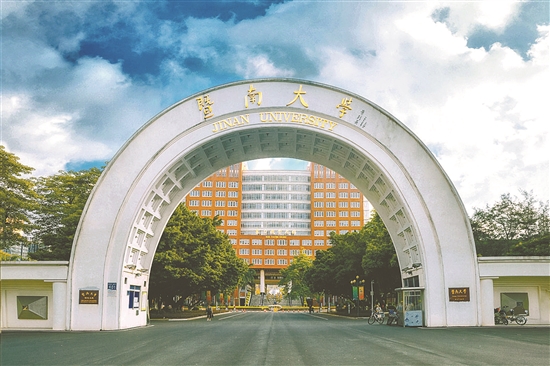 The main entrance of Jinan University. Photo by Liu Hanbo
The main entrance of Jinan University. Photo by Liu Hanbo
As a teacher, I have witnessed the inheritance of Chinese culture in the past two years. I have also joined this cultural relay race by myself. Since 2019, I have also served as the president of Sihai Academy, and all the students of the Academy are students from Hong Kong, Macao, Taiwan and overseas Chinese. In their first year of general education, a large number of traditional cultural courses were incorporated, and a rich variety of second classes were opened to allow students to widely understand, learn and inherit Chinese culture.
Recently, the college has added traditional sports such as archery, boxing, and short-soldiers based on poetry Cinema 1950 witch cloth draw, tea art, dragon and lion dance and other contents. Many overseas students told me that they had basically never been exposed to these things before. Now, the school specially hires teachers to teach them, and I feel very happy.
Create better conditions for overseas Chinese to return to their motherland to study and inherit Chinese culture. We always keep the General Secretary’s instructions in mind. In 2019, we integrated and upgraded the school’s “Chinese Culture Festival” into “Chinese Culture Month”, covering more than 30,000 teachers and students in five campuses, and continued for a whole semester.
At the China Talent Training Base, we first Komiks 1960 witch cloth draw and then held training classes on calligraphy, painting, cheongsam, Tai Chi, etc., attracting Chinese and overseas Chinese students from more than 30 countries and regions.(Compiled/Reporter Yan Min)
Chaozhou Chaozhou Guangji Bridge
[Inspection footprints]
On the afternoon of October 12, 2020, Xi Jinping came to Chaozhou City for inspection. Guangji Bridge, located outside the east gate of Chaozhou ancient city, was built during the Southern Song Dynasty and spanned both sides of the Han River. It has a unique style, integrating beam bridges, floating bridges and arch bridges. It is known as “the earliest open and closed bridge in the world.” Xi Jinping walked along the bridge, inspected the bridge pavilions and floating bridges, looked at the scenery on both sides of the Han River, learned about the historical and cultural characteristics of the bridge Babaylan 1990 cloth draw, and listened to the introduction of the restoration and protection of Guangji Bridge.
Then, Xi Jinping walked through Guangji Gate on the banks of Guangji Bridge and climbed the Guangji Tower along the stone steps. Xi Jinping came to the second-story eaves corridor and looked up at the distance. He looked at the distance. The Han River was wide and the long bridge was lying on the waves.
After listening to the report on the history of Guangji Building and the restoration and protection of the ancient city, Xi Jinping emphasized that the Chaozhou ancient city, including Guangji Bridge and Guangji Building, has been preserved relatively well, which is rare and precious. In the process of transforming the old city and developing new cities, we must protect the urban historical and cultural heritage, continue the urban cultural context, and make history and the contemporary complement each other.
[Personal Eyewitness]
Yu Xiaojie, Director of Chaozhou Guangjiqiao Cultural Relics Management Office: Understand the soul of Chaozhou culture and tell the story of Chaozhou in the new era well
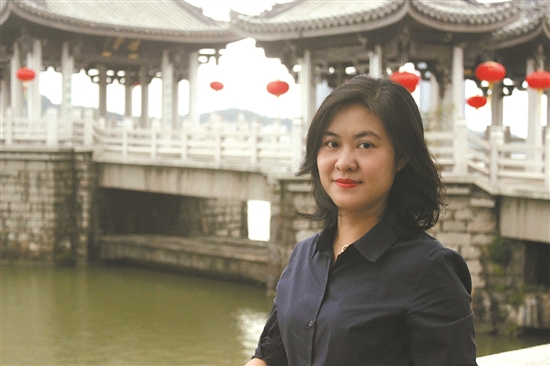 Yu Xiaojie
Yu Xiaojie
At that time, I was responsible for explaining the Guangji Bridge and Guangjilou intangible cultural heritage exhibitions and archway blocks to the General Secretary. The General Secretary stopped to look at and gain in-depth understanding whenever he went. He told everyone affectionately that Chaozhou has a long history and rich culture, and is a national historical and cultural city. Many people come to visit Babaylan 1990 cloth draw.
We must protect old urban areas with historical and cultural value, highlight urban characteristics, enhance the connotation of cultural tourism, and allow people to receive more education. I came to Chaozhou more than 40 years ago. I came here again today and felt relieved to see Chaozhou thriving. I hope that the cadres and masses of Chaozhou will seize the opportunity, take advantage of the momentum, rise up, and build Chaozhou into a more beautiful way!
General Secretary’s words greatly inspired the confidence and pride of the people of Chaozhou, and pointed out the direction of Chaozhou’s development in the direction of Chaozhou’s development, and are the biggest driving force for Chaozhou’s development. As a cultural and museum worker, I deeply realize that culture is the “root” and “soul” of urban development. Over the years, the path of research, repair and development of ancient cities has been the correct path for Chaozhou’s development.
 Guangji Bridge is known as “the earliest open and closed bridge in the world.” Photo by Yi Luya, an all-media reporter of Yangcheng Evening News
Guangji Bridge is known as “the earliest open and closed bridge in the world.” Photo by Yi Luya, an all-media reporter of Yangcheng Evening News
After October last year, I truly felt that Chaozhou ushered in a new development opportunity once in a century. The Chaozhou Municipal Party Committee and Municipal Government took action and carefully planned to transform the excellent characteristics of Chaozhou culture into an endogenous driving force for promoting high-quality economic and social development…
For a time, tourists from all over Chaozhou not only came to review the General Secretary’s inspection journey and felt the unique beauty of Chaozhou, but also scholars and artists who came to study Chaozhou culture, and entrepreneurs who came to inspect the investment opportunities of Chaozhou’s cultural and tourism industry. This thousand-year-old ancient city has become a popular investment hotspot. Many cultural and tourism projects have been implemented one after another, and Chaozhou has also ushered in an unprecedented highlight moment.
Now, I welcome the visitors who come to Babaylan 1990 clothes draw every day, and I feel extremely proud and happy between Guangji Bridge, Guangji Building and the ancient city even more busy, but I feel extremely proud and happy – because this place I regard as the pursuit and glory of life. Looking at this vibrant ancient city, the tourists and enthusiastic operators who linger because of their love for this ancient city, I feel full of pride. I firmly believe that Chaozhou will definitely be more beautiful tomorrow Cinema 1950 witch cloth draw!
As a bridge guard and a cultural relics worker, I will keep in mind General Secretary Xi Jinping’s earnest instructions and affectionate encouragement, and deeply understand the significance of this job and the responsibility on my shoulders.
We must not only protect this ancient city, deeply understand the soul of Chaozhou culture, and tell the story of Chaozhou in the new era, but also deeply explore the connotation and characteristics of Chaozhou culture, promote the creative transformation and innovative development of Chaozhou’s excellent traditional culture, transform Chaozhou’s profound cultural heritage into development soft power, let the “speciality” of culture become the core competitiveness of Chaozhou, and let the “speciality” of culture be developed for Chaozhou.The exhibition injects stronger and more lasting momentum! (Compiled/Reporter Yi Luya)
Chaozhou Chaozhou Guangji Building
[Inspection footprints]
On the afternoon of October 12, 2020, Xi Jinping came to Chaozhou City for inspection. Xi Jinping walked through Guangji Gate on the banks of Guangji Bridge and climbed the Guangji Tower along the stone steps. In the exhibition hall upstairs, Xi Jinping inspected Chaozhou intangible cultural heritage works, Komiks 1960 witch cloth draw watched the on-site production demonstration of representatives of the intangible cultural heritage project inheritors, and had cordial exchanges with them to understand the inheritance of Chaozhou’s traditional skills. Xi Jinping pointed out that Chaozhou culture has distinct regional characteristics, is an important part of Lingnan culture, and is an important branch of Chinese culture. The Chaozhou intangible cultural heritage represented by Chaozhou embroidery, Chao porcelain, Chaohua, Chaohua, Chaozhou sculpture, Chaozhou opera, Gongfu tea, Chaozhou cuisine, etc. is the romance of Chinese culture. We must strengthen the protection and inheritance of intangible cultural heritage, actively cultivate inheritors, and let the intangible cultural heritage shine with more charming brilliance.
【Echo of Nanyue】
Yao Xuanqiu, a famous Chaozhou opera performing artist and national representative inheritor of Chaozhou opera national intangible cultural heritage project: I am willing to do my best to contribute to Chaozhou opera
 Yao Xuanqiu
Yao Xuanqiu
General Secretary Xi Jinping specifically mentioned during his inspection in Chaozhou that Chaozhou intangible cultural heritage represented by Chaozhou embroidery, Chao porcelain, Chaohua, Chaohua, Chaozhou sculpture, Chaozhou opera, Gongfu tea, Chaozhou cuisine, etc.Komiks 1960 witch cloth draw is a treasure of Chinese culture. This makes our Chao Opera world feel very honored and happy. Every time I think of this, I am very moved and proud.
I have been in the art for more than 70 years. What impressed me the most was that I performed in Huairen Hall in Beijing in 1957 and was received by leaders such as Mao Zedong and Zhou Enlai. At that time, I starred in Su Liuniang in “Su Liuniang” and Huang Wuniang in “Li Jing Ji”, especially Wang Jinzhen in “The Sweeping Club”, which was praised by the capital’s literary and artistic circles.
As a local opera genre, Chaozhou Opera was founded in New ChinaLater, under the leadership of the Party, I broke free from the shackles of the “child actor system” and ushered in great prosperity and great development. As a representative of the new generation of Chaozhou opera actors trained by the Party after the founding of New China, I represented Chaozhou opera. From the local area to the capital to perform, it was an honor that I would never forget in my life. This is not only my glory, but also the glory of Chaozhou opera genre.
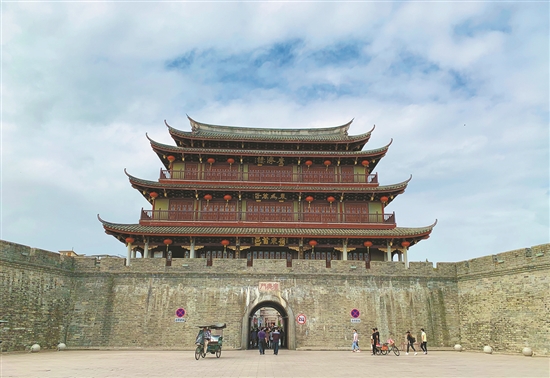 Guangji Tower is one of the landmarks of Chaozhou Ancient City. Photo by Yi Luya, an all-media reporter of Yangcheng Evening News
Guangji Tower is one of the landmarks of Chaozhou Ancient City. Photo by Yi Luya, an all-media reporter of Yangcheng Evening News
Chao Opera is an ancient genre and is still full of vitality. I think this is related to Chao Opera always insisting on keeping pace with the times. As a national representative inheritor of Chao Opera, I am well aware of the heavy responsibilities and missions I shoulder and should make more efforts for the inheritance and development of Chao Opera.
My family lives in Guangzhou. For more than 20 years of retirement, I have been traveling between Shantou and Guangzhou, mainly engaged in the inheritance of Chao Opera. As long as I can, no matter how old I am, I have to do this. Because, my performing arts were passed down to me by my predecessors, and I must pass them to the younger generation. Only in this way can the art of Chao Opera be passed down from generation to generation.
As long as young people are willing to learn, I am willing to teach, and I don’t care whether I have performed a ritual of apprenticeship. Wu Ling’er, the first student I was to guide and train, did not hold a disciple apprenticeship ceremony. But she was humble and studious, and after she came out of school, I followed me and taught her the role of “Huang Wuniang”. Wu Ling’er has achieved success in her studies and became the second generation of “Huang Wuniang” after the founding of New China and after me.
This year, the Chinese Academy of Opera specially opened the first Chao Opera undergraduate class for Chao Opera, which has a great effect on improving the cultural quality of Chao Opera artists. Shantou has also introduced a series of relevant policies to promote the promotion and development of Chao Opera in the new era. I think that according to this trend, Chaozhou opera will usher in a new peak of development.
Next, I will do my best to perform and inherit the Chaozhou opera well. I am willing to do my best to contribute everything to Chao Opera. (Compiled/Reporter Huang Zhouhui)
Shantou Shantou Overseas Chinese Approved Cultural Relics Museum
[Inspection footprints]
On the afternoon of October 13, 2020, Xi Jinping visited the Overseas Chinese Approved Cultural Relics Museum with the characteristics of Chaoshan Overseas Chinese hometown. Xi Jinping listened to the introduction of overseas Chinese criticism history and Chaoshan Overseas Chinese culture.
He emphasized that the “Overseas Criticism” records the difficult entrepreneurial history and strong sense of family and country of the older generation of overseas Chinese, and is also an important manifestation of the Chinese nation’s credibility and keeping its promises. We must protect these “Overseas Chinese Approval” cultural relics, strengthen research, educate and guide people not to forget the humiliating history experienced by modern my country and the difficult entrepreneurial history of the older generation of overseas Chinese, and promote the whole society to strengthen the construction of integrity.
【Personal Eyewitness】
Lin Qingxi, Director of Shantou Overseas Chinese Approval Cultural Relics Museum: Strive to promote the digitalization of Overseas Chinese Approval and create a world memory heritage database
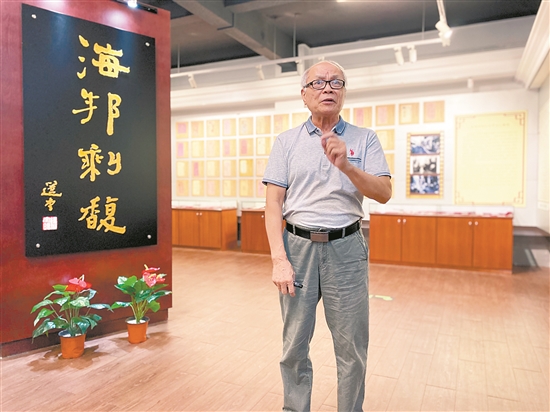 Lin Qingxi
Lin Qingxi
October 13, 2020, is a lifelong day for me and the Overseas Chinese Approved Cultural Relics Museum. On the same day, at the Overseas Chinese Approval Cultural Relics Museum, I had the honor to introduce the Overseas Chinese Approval and Overseas Chinese Approval culture to General Secretary Xi Jinping in detail, and talked about the transfer process of writing, sending, sending and returning to the Purchase.
What impressed me most was that in the southeast corner of the first floor exhibition hall, a city basket (a cylindrical basket made of all bamboo green in Chaoshan) was displayed. The General Secretary came to the showcase and learned the story of this city basketball team very carefully.
For the General Secretary Babaylan 1990 cloth draw, I introduced the city basketball team to cross the ocean with the owner on a red-headed boat a hundred years ago, traveling between Southeast Asia and Chaoshan, experiencing the test of stormy waves and witnessing the journey of overseas Chinese to Southeast Asia. Now this city basket has become a collection of cultural relics.
While the General Secretary was watching the exhibition, I also read the seven-character quatrain with the title “difficult” in Mandarin. This poem reflects the hardships and helplessness of overseas Chinese to make a living outside and their longing for their relatives in their hometown. I originally wanted to recite this seven-character quatrain again in Chaoshan dialect rhyme, but unfortunately, there is not enough time.
We have a group of elderly people with an average age of over 60 years old. After they retired, they went to work in the Chinese Cultural Relics Museum. We spent several years, together with other retired comrades from Chaoshan Historical and Cultural Research Center, reprinted more than 100,000 original copies of overseas Chinese approvals into a book, and compiled and published the “Chaoshan Overseas Chinese Approval Integration” and placed it in the display cabinet.
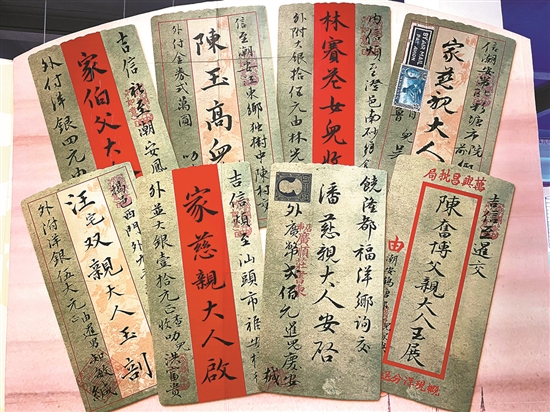 The “Overseas Chinese Comment” records the difficult entrepreneurial history and strong feelings for the older generation of overseas Chinese. Photo by Zhao Yingguang, a reporter from Yangcheng Evening News.
The “Overseas Chinese Comment” records the difficult entrepreneurial history and strong feelings for the older generation of overseas Chinese. Photo by Zhao Yingguang, a reporter from Yangcheng Evening News.
I am over 70 years old this year. From the day I decided to devote myself to protecting the cultural relics approved by overseas Chinese, I told myself that I would better pass on these precious cultural relics that witness the history of Chinese people’s overseas struggle. Next, I will continue to collect, organize, protect, develop and utilize overseas Chinese approvals.
The Overseas Chinese Approved Cultural Relics Museum provides very favorable conditions for the collection, display and research of Overseas Chinese Approved Cultural Relics. Its rich Overseas Chinese Approved Archives and Data Retrieval System is conducive to overseas Chinese seeking roots. For example, the foreign affairs and overseas Chinese affairs department can take the lead in carrying out activities such as round-trip criticism and gatherings, finding the historical trajectory of the family and family. Overseas Chinese use the return of the country to search for relatives; domestic overseas Chinese are using the Komiks 1960 witch cloth draw is a guide to search for relatives overseas and jointly implement the “root” culture.
Overseas Chinese appraisal is also conducive to the education of the new generation of overseas Chinese, and is conducive to further uniting the hearts of overseas Chinese, enhancing the cultural identity of overseas Chinese in the country and hometown, and strengthening cultural exchanges at home and abroad.
As “Overseas Chinese appraisal”, we recommend that the Guangdong Provincial Archives Bureau Overseas Chinese Appraisal Database, the State Overseas Chinese Office of Jinan University, and the Overseas Chinese Appraisal Database of Shantou University, etc., to discuss the Cinema 1950 witch cloth DrawFully implement the specific measures of the “Guangdong Province Overseas Chinese Approval Archives Protection and Management Measures”, integrate data, form a large world memory heritage database, and form a search system that “matches relatives”.
Cultural relics are witnesses of history and a carrier of civilization. The cultural relics collected in museums, heritage displayed on the vast land, and text written in ancient books are all alive. Next, we hope that by further revitalizing the cultural relics in the museum, the cultural relics approved by overseas Chinese become the carriers and disseminators of overseas Chinese culture and Chinese culture, so that overseas Chinese people can remember their homesickness, keep their historical roots, and inherit Chinese civilization. (Compiled/Reporter) Tan Zheng)
Shantou Shantou Port Opening Culture Exhibition Hall
【Inspection Footprints】
On the afternoon of October 13, 2020, Xi Jinping visited the Small Park Port Opening District of Shantou City for inspection and investigation. Xi Jinping visited the Shantou Port Opening Culture Exhibition Hall to learn about the history of Shantou Port Opening and the development achievements of the special economic zone, and listen to the report on the next development plan of Shantou City.
Xi Jinping pointed out that the Shantou Special Economic Zone is one of the earliest special economic zones established after the reform and opening up. The connotation, conditions and requirements of reform and opening up in the new era are very different from the past. Hope Cinema 1950 witch clothes drawShantou conducts in-depth investigations and research, carefully considers and plans, and comes up with ideas and measures that can truly solve problems. If the path is right, we must work hard for a long time without success in the realm of success. We must make full use of major opportunities such as the construction of the Guangdong-Hong Kong-Macao Greater Bay Area and jointly build the “Belt and Road”, find the right position, play to our strengths and avoid our weaknesses, promote reform and opening up with greater courage and a higher starting point, and catch up in the construction of special economic zones in the new era.
[Emperors say]
Huang Shaoyan, the tour guide of Shantou Port Opening Culture Exhibition Hall: As a tour guide, I explained the history of Shantou Port Opening Culture Exhibition Hall, as the tour guide, I explained the history of Shantou Port Opening Culture Zone and the achievements of the development of the special economic zone to the General Secretary. This will be the most unforgettable memory in my life.
At that time, I introduced three parts of the exhibition to the General Secretary. The first part was “Port: Opening ports and trading ports under strong ships and powerful guns”, the second part was “City: Development and Culture in Historical Changes”, and the third part was “Special Economic Zone: The Great Creation of Opening Up to the Outside.
Shantou is located at the estuary of the three rivers of Hanjiang, Rongjiang and Lianjiang. It is located in the central area of eastern Guangdong. It is known as the “gateway to Lingdong and the key to South China”. It is also an important starting port of the ancient Maritime Silk Road. Keywords such as “opening port”, “port”, “overnment of overseas Chinese”, “opening”, etc. have become the historical mark of the development of this city.
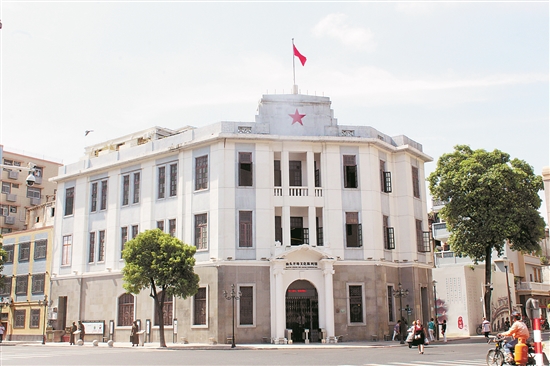 The Shantou Port Opening Culture Exhibition Hall condenses the development of Shantou since its establishment. Photo by Yi Luya, all-media reporter of Yangcheng Evening News
The Shantou Port Opening Culture Exhibition Hall condenses the development of Shantou since its establishment. Photo by Yi Luya, all-media reporter of Yangcheng Evening News
Shantou Port Opening Cultural Exhibition Hall, as a cultural business card of Shantou City, condenses and displays the development of Shantou since the opening of the port on January 1, 1860, and records the historical process of Shantou from passive port opening to active opening, and then to full opening in the new era.
As a cultural and literary figure, I can deeply feel that Shantou’s development has always been closely linked to the destiny of the country and the nation, and can deeply understand the profound significance of opening a port to bring openness, opening up drives development, and development creates the future.
Standing at a new historical starting point, I am also delighted to see that Shantou plays an important role in the national “Belt and Road” initiative. Among them, Shantou Port, as one of the 15 key construction ports in the country’s “Belt and Road”, is an important channel for eastern Guangdong and even the Pan-Pearl River Delta to connect countries along the “Maritime Silk Road” (Maritime Silk Road).
While taking great pride in my hometown, I will continue to study and research in my future work, and carry forward the courage to venture, dare to try, be the first, and work hard.The spirit of the special zone, further understand the culture of Shantou’s port opening and Chaoshan culture, tell the story of Shantou well, and be a good disseminator of Chaoshan culture.